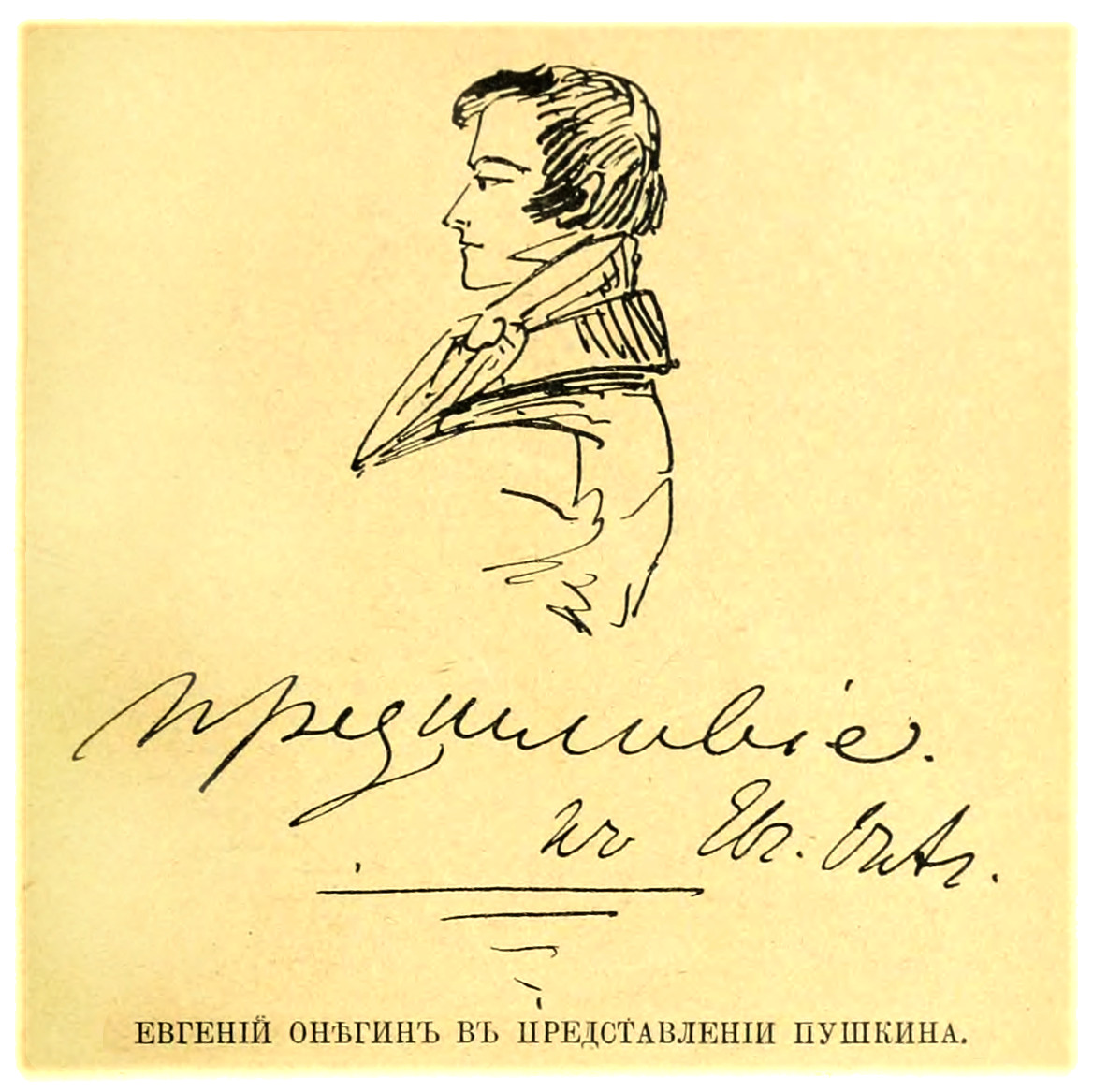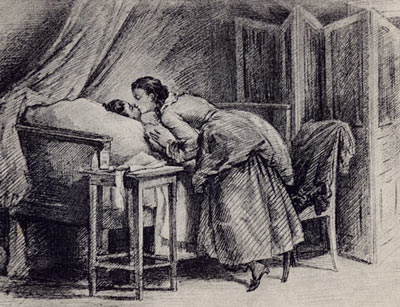|
Pushkin
Alexander Sergeyevich Pushkin (; rus, links=no, Александр Сергеевич ПушкинIn pre-Revolutionary script, his name was written ., r=Aleksandr Sergeyevich Pushkin, p=ɐlʲɪkˈsandr sʲɪrˈɡʲe(j)ɪvʲɪtɕ ˈpuʂkʲɪn, a=ru-Pushkin.ogg; ) was a Russian poet, playwright, and novelist of the Romantic era.Basker, Michael. Pushkin and Romanticism. In Ferber, Michael, ed., ''A Companion to European Romanticism''. Oxford: Blackwell, 2005. He is considered by many to be the greatest Russian poetShort biography from University of Virginia . Retrieved 24 November 2006.Allan Rei ... [...More Info...] [...Related Items...] OR: [Wikipedia] [Google] [Baidu] |
Eugene Onegin
''Eugene Onegin, A Novel in Verse'' ( pre-reform Russian: ; post-reform rus, Евгений Оне́гин, ромáн в стихáх, p=jɪvˈɡʲenʲɪj ɐˈnʲeɡʲɪn, r=Yevgeniy Onegin, roman v stikhakh) is a novel in verse written by Alexander Pushkin. ''Onegin'' is considered a classic of Russian literature, and its eponymous protagonist has served as the model for a number of Russian literary heroes (so-called ''superfluous men''). It was published in serial form between 1825 and 1832. The first complete edition was published in 1833, and the currently accepted version is based on the 1837 publication. Almost the entire work is made up of 389 fourteen-line stanzas (5,446 lines in all) of iambic tetrameter with the unusual rhyme scheme , where the uppercase letters represent feminine rhymes while the lowercase letters represent masculine rhymes. This form has come to be known as the "Onegin stanza" or the "Pushkin sonnet". The innovative rhyme scheme, the natural tone a ... [...More Info...] [...Related Items...] OR: [Wikipedia] [Google] [Baidu] |
Abram Petrovich Gannibal
Abram Petrovich Gannibal, also Hannibal or Ganibal, or Abram Hannibal or Abram Petrov ( ru , Абра́м Петро́вич Ганниба́л; c. 1696 – 14 May 1781), was a Russian military engineer, general-in-chief, and nobleman of African origin. Kidnapped and enslaved as a child by Ottomans, Gannibal was traded to Russia and presented as a gift to Peter the Great, where he was freed, adopted and raised in the Emperor's court household as his godson.Phillips, Mike"Pushkin's African background – the Pushkins and the Gannibals."British Library. Retrieved May 26, 2016. Gannibal eventually rose to become a prominent member of the imperial court in the reign of Peter's daughter Elizabeth. He had 11 children, most of whom became members of the Russian nobility; he was a great-grandfather of the author and poet Alexander Pushkin. Early life The main reliable accounts of Gannibal's life come from ''The Moor of Peter the Great,'' Pushkin's unfinished biography of his great-g ... [...More Info...] [...Related Items...] OR: [Wikipedia] [Google] [Baidu] |
Natalia Pushkina
Natalia Nikolayevna Pushkina-Lanskaya (russian: link=no, Наталья Николаевна Пушкина-Ланская; 8 September 1812 – 26 November 1863) ( Goncharova) (Гончарова), was the wife of the Russian poet Alexander Pushkin from 1831 until his death in 1837 in a duel with Georges d'Anthès. Natalia was married to Major-General Petr Petrovich Lanskoy from 1844 until her death in 1863. Prior to marriage Natalia (Natalya) Goncharova was born on 8 September 1812 (27 August 1812 Old Style) in Karian village in Tambov Governorate (in present-day Znamensky District, Tambov Oblast), where her family lived during the occupation of Moscow by the forces of Napoleon. Her father, Nikolay Afanasievich Goncharov, a scion of the family of paper manufacturers from Kaluga, was pronounced demented in 1815; the household was managed by his wife, Natalia Ivanovna Zagriajskaya, an imperious lady with connections within Muscovite nobility. Her ancestors included Petro Doros ... [...More Info...] [...Related Items...] OR: [Wikipedia] [Google] [Baidu] |
Boris Godunov (play)
''Boris Godunov'' (russian: Борис Годунов, Borís Godunóv; variant title: ''Драматическая повесть, Комедия o настоящей беде Московскому государству, o царе Борисе и о Гришке Отрепьеве'', ''A Dramatic Tale, The Comedy of the Distress of the Muscovite State, of Tsar Boris, and of Grishka Otrepyev'') is a closet play by Alexander Pushkin. It was written in 1825, published in 1831, but not approved for performance by the censor until 1866 . Its subject is the Russian ruler Boris Godunov, who reigned as Tsar from 1598 to 1605. It consists of 25 scenes and is written predominantly in blank verse. Modest Mussorgsky's opera, '' Boris Godunov'' (1874), is based on this play. History Composition Having finished the play, Pushkin famously wrote to his friend Pyotr Vyazemsky: " What a Pushkin, what a son of a bitch!". Pushkin wrote of the play: The study of Shakespeare, Karamzin, and o ... [...More Info...] [...Related Items...] OR: [Wikipedia] [Google] [Baidu] |
Georges-Charles De Heeckeren D'Anthès
Baron Georges-Charles de Heeckeren d'Anthès (born Georges-Charles d'Anthès; 5 February 1812 – 2 November 1895) was a French military officer and politician. Despite his later career as a senator under the Second French Empire, D'Anthès is mostly known for fatally wounding the Russian poet Alexander Pushkin in a duel in 1837. Career Born in Colmar to aristocratic Alsatian parents, the first boy among six children, he was destined for a military career. He was therefore sent to Saint-Cyr, the premier French military academy, and, in 1830, as cavalry officer, he supported Charles X's party during the July Revolution. After the exile of Charles X, d'Anthès refused to serve under the July Monarchy, resigned from the army and withdrew to his father's home in Alsace. As he was authorized by the French government to serve abroad without losing his nationality, he set off first for Prussia, then for Russia. In St. Petersburg, he succeeded in entering the Knights Guards of the ... [...More Info...] [...Related Items...] OR: [Wikipedia] [Google] [Baidu] |
Golden Age Of Russian Poetry
Golden Age of Russian Poetry (or ''Age of Pushkin'') is the name traditionally applied by philologists to the first half of the 19th century. The most significant Russian poet Pushkin (in Nabokov's words, the greatest poet this world was blessed with since the time of Shakespeare) and other famous poets worked during this time. Mikhail Lermontov and Fyodor Tyutchev are generally regarded as two most important Romantic poets after Pushkin. Other poets include Pyotr Vyazemsky, Anton Delvig, Kondraty Ryleyev. The best-regarded of Pushkin's precursor Vasily Zhukovsky and Konstantin Batyushkov may be also included. Pushkin himself, however, considered Evgeny Baratynsky to be the finest poet of his day. Image:Zhukovsky 1815.jpg, Vasily Zhukovsky Image:AleksandrPushkin.jpg, Alexander Pushkin File:Evgeny Boratynsky by Francois Frederic Chevalier (1812-1849).jpg, Evgeny Baratynsky Image:Lermontov-Autoportrait.jpg, Mikhail Lermontov Poets References See also * Silver Age of Russ ... [...More Info...] [...Related Items...] OR: [Wikipedia] [Google] [Baidu] |
Russian Literature
Russian literature refers to the literature of Russia and its émigrés and to Russian language, Russian-language literature. The roots of Russian literature can be traced to the Middle Ages, when epics and chronicles in Old East Slavic were composed. By the Age of Enlightenment, literature had grown in importance, and from the early 1830s, Russian literature underwent an astounding golden age in poetry, prose and drama. Romanticism permitted a flowering of poetic talent: Vasily Zhukovsky and later his protégé Alexander Pushkin came to the fore. Prose was flourishing as well. Mikhail Lermontov was one of the most important poets and novelists. The first great Russian novelist was Nikolai Gogol. Then came Ivan Turgenev, who mastered both short stories and novels. Fyodor Dostoyevsky, Fyodor Dostoevsky and Leo Tolstoy soon became internationally renowned. Other important figures of Russian realism were Ivan Goncharov, Mikhail Saltykov-Shchedrin and Nikolai Leskov. In the second h ... [...More Info...] [...Related Items...] OR: [Wikipedia] [Google] [Baidu] |
Ode To Liberty (poem)
"Ode to Liberty" is a poem written by Alexander Pushkin. Upon graduation from the Lycee, Pushkin publicly recited the poem, one of several that led to his exile by Emperor of All Russia, Tsar Alexander I of Russia, Alexander the First. Authorities summoned Pushkin to Moscow after the poem was found among the belongings of the rebels from the Decembrist revolt, Decembrist Uprising (1825). References Russian poetry Alexander Pushkin, Alexander Pushkin 1800s poems {{poem-stub ... [...More Info...] [...Related Items...] OR: [Wikipedia] [Google] [Baidu] |
The Captain's Daughter
''The Captain's Daughter'' (russian: «Капитанская дочка», Kapitanskaya dochka) is a historical novel by the Russian writer Alexander Pushkin. It was first published in 1836 in the fourth issue of the literary journal ''Sovremennik''. The novel is a romanticized account of Pugachev's Rebellion in 1773–1774. The title "The Captain's Daughter" has also been used to refer to a collection of stories, one of which was the actual novel. Plot Pyotr Andreyich Grinyov (the narrative is conducted on his behalf) is the only surviving child of a retired Imperial Army officer. When Pyotr turns 17, his father sends him into military service in Orenburg. While en route, Pyotr gets lost in a blizzard, but is rescued by a mysterious man. As a token of his gratitude, Pyotr gives the guide his hareskin coat. Arriving in Orenburg, Pyotr reports to his commanding officer and is assigned to serve at Fort Belogorsky under Captain Ivan Mironov. The "fort" is little more than a fence ... [...More Info...] [...Related Items...] OR: [Wikipedia] [Google] [Baidu] |
Tsarskoye Selo Lyceum
The Imperial Lyceum (Императорский Царскосельский лицей, ''Imperatorskiy Tsarskosel'skiy litsey'') in Tsarskoye Selo near Saint Petersburg, also known historically as the Imperial Alexander Lyceum after its founder Tsar Alexander I, was an educational institution which was founded in 1811 with the object of educating youths of the best families who would afterwards occupy important posts in the Imperial service. Its regulations were published on 11 January 1811, but they had received the Imperial sanction on 12 August 1810, when the four-story "new" wing of the Great Palace was appointed for its accommodation, with special premises for a hospital, a kitchen and other domestic requirements, as well as a residence for the administrative staff. Furniture and utensils were given together with the Neoclassical building, designed by Vasily Stasov, next to the Catherine Palace. The Tsarskoye Selo Lyceum was opened on 19 October 1811. The first graduates ... [...More Info...] [...Related Items...] OR: [Wikipedia] [Google] [Baidu] |
Duel
A duel is an arranged engagement in combat between two people, with matched weapons, in accordance with agreed-upon Code duello, rules. During the 17th and 18th centuries (and earlier), duels were mostly single combats fought with swords (the rapier and later the small sword), but beginning in the late 18th century in England, duels were more commonly fought using pistols. Fencing and shooting continued to co-exist throughout the 19th century. The duel was based on a Code of conduct, code of honor. Duels were fought not so much to kill the opponent as to gain "satisfaction", that is, to restore one's honor by demonstrating a willingness to risk one's life for it, and as such the tradition of dueling was originally reserved for the male members of nobility; however, in the modern era, it extended to those of the upper classes generally. On occasion, duels with swords or pistols were fought between women. Legislation against dueling goes back to the medieval period. The Fourth Co ... [...More Info...] [...Related Items...] OR: [Wikipedia] [Google] [Baidu] |
Vladimir Nabokov
Vladimir Vladimirovich Nabokov (russian: link=no, Владимир Владимирович Набоков ; 2 July 1977), also known by the pen name Vladimir Sirin (), was a Russian-American novelist, poet, translator, and entomologist. Born in Imperial Russia in 1899, Nabokov wrote his first nine novels in Russian (1926–1938) while living in Berlin, where he met his wife. He achieved international acclaim and prominence after moving to the United States, where he began writing in English. Nabokov became an American citizen in 1945 and lived mostly on the East Coast before returning to Europe in 1961, where he settled in Montreux, Switzerland. From 1948 to 1959, Nabokov was a professor of Russian literature at Cornell University. Nabokov's 1955 novel '' Lolita'' ranked fourth on Modern Library's list of the 100 best 20th-century novels in 2007 and is considered one of the greatest 20th-century works of literature. Nabokov's ''Pale Fire'', published in 1962, was ranked ... [...More Info...] [...Related Items...] OR: [Wikipedia] [Google] [Baidu] |







